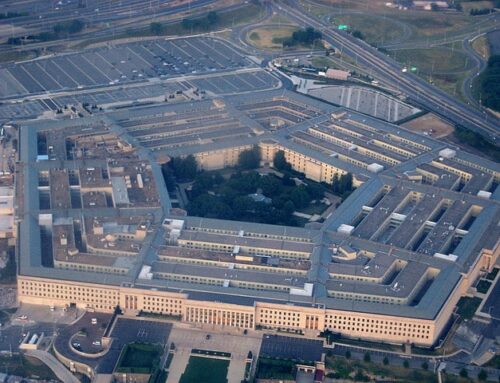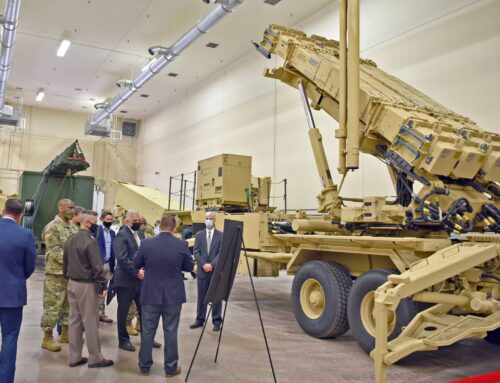The House and Senate passed the National Defense Authorization Act (NDAA) for Fiscal Year 2024 on December 14th and sent it to the President for his signature. The bill authorizes $886 billion in national security spending for the year.
Compared to last year, this year’s Pentagon spending topline is $25.5 billion (3 percent) higher. That’s a good size raise for an agency that just failed its 6th audit in as many years, and it doesn’t even include the supplemental spending requests that Congress may yet pass in one form or another. Beyond the topline numbers, there’s some good news, some bad news, and some ugly news on Taxpayers for Common Sense priorities in this year’s NDAA.
The Good
In the wake of the Pentagon’s most recent audit failure, conferees took some important steps towards holding the Pentagon accountable. Sec. 1004 requires each component of the Pentagon be subject to an independent audit, or else forfeit 1.5 percent of any unobligated funds to the Treasury for deficit reduction. Sec. 1005 then instructs the Secretary of Defense to ensure that the Pentagon can pass an audit by not later than December 31, 2028, setting out a clear goal after Pentagon officials backed away from previous timelines for passing an audit. Taxpayers for Common Sense has been working to hold the Pentagon accountable for its accounting for over two decades. We’re pleased to see that Congress is moving towards establishing some real accountability for the Pentagon’s continued failure to pass an audit.
Conferees also took steps that could help protect taxpayers from unwarranted Pentagon contractor price hikes. Sec. 802 requires the Under Secretary of Defense for Acquisition and Sustainment to “develop a framework for revising what constitutes a denial of uncertified cost or pricing data…” The provision lays out specific steps that will help the Pentagon assess whether contractors are effectively denying Pentagon requests for cost or pricing data. And Sec. 874 establishes a pilot program that will offer higher progress payments for Pentagon contracts based on performance of those contracts, with criteria for this incentive to be developed by the Under Secretary of Defense for Acquisition and Sustainment after a 30-day period to allow for public comment. This second provision is more of an opportunity than a victory at this point, but if the Under Secretary puts forward incentives relating to transparency on cost or pricing data, this could help the Pentagon ensure it’s not being overcharged.
The Bad
Regarding Unfunded Priorities Lists (UPLs), extrabudgetary wish lists that Congress requires military service and combatant command leaders to submit each year, TCS has consistently called for the repeal of the statutory requirement, a position supported by the Secretary of Defense. So, we were less than thrilled to see Congress moving in the opposite direction with a provision (Sec. 211) requiring a new UPL from the Secretary of Defense on Defense-Wide research, development, test and evaluation (RDT&E) projects. Forcing military leaders to ask Congress for additional funding beyond what is included in the base Pentagon budget is a great way to add more money to the budget for projects the Pentagon doesn’t really need. That’s bad fiscal policy, and ultimately bad national security policy because it subverts civilian control over the military. If the Pentagon can’t find room for these unfunded projects in its soon-to-be $842 billion budget, we don’t think they should be considered priorities.
In even worse news, the conference committee maintained a provision (Sec. 826 in the final bill) from the House-passed NDAA that authorizes industry-wide inflation bailouts for Pentagon contractors in the form of economic price adjustments to existing fixed-price contracts and options. The same provision failed in last year’s NDAA, in part due to the Pentagon’s guidance in May 2022 that “contractors performing under firm-fixed-price (FFP) contracts generally must bear the risk of cost increases, including those due to inflation,” and guidance in September 2022 reiterating that point.
This provision disincentivizes companies from negotiating contracts in good faith. Contractors have the option to negotiate for economic price adjustment clauses in fixed-price contracts to address unforeseen economic hardships like inflation. These fixed-price contracts with economic price adjustments (FPEPAs) normally include a mechanism that mitigates cost risks for both the Pentagon and the contractor, in which the Pentagon assumes the cost up to an agreed upon limit. By authorizing retroactive economic price adjustments, Congress is encouraging Pentagon contractors to forgo negotiations to secure equitable economic price adjustment clauses before signing contracts, instead incentivizing them to pursue full relief from unforeseen economic circumstances like inflation at the taxpayer’s expense.
In short, this provision encourages Pentagon contractors to ignore economic risks when negotiating contracts with the knowledge that they can come to Congress for a taxpayer-funded bailout whenever unforeseen economic conditions arise. Furthermore, there’s scant evidence that contractors are actually struggling due to inflation, as our friends at the Project on Government Oversight recently highlighted in their analysis of Northrop Grumman’s push for inflation relief for the B-21 bomber.
Ahead of the conference report release, TCS raised our concerns over this provision with NDAA conferees and called for its removal. Instead, conferees sided with industry profits over taxpayer interests by authorizing these cash grabs for Pentagon contractors.
NDAA conferees also included several provisions restricting the Pentagon’s ability to retire aging military equipment.
Sec. 1021 prohibits the use of funds to retire or place in storage three dock landing ships and one guided missile cruiser. According to the Deputy Assistant Secretary of the Navy for budget, “the decision to request this divestment was based on material condition, life remaining, cost and then time to upgrade, and of course the resultant warfighting value.” Congressional interference in Pentagon plans to retire ships that do not meet mission requirements or are otherwise problematic to maintain puts unnecessary upward pressure on the entire Pentagon budget. In our recent report on the Marine Corps transformation plan, we highlighted how this kind of interference has put a strain on the Marine Corps’ original vision for a budget-neutral transformation.
Sec. 131 prevents the Air Force from retiring more than 68 F-15E aircraft before September 2029, and from reducing funding for unit personnel or weapon system sustainment activities for F-15E aircraft in a way that assumes congressional authority for future divestments from such aircraft.
Sec. 139 prohibits the use of funds for retiring or preparing to retire KC-135 aircraft.
Sec. 144 prevents the retirement of any F-16C/D aircraft for 180 days following the submission of a report to Congress on a plan for long-term Air Force fighter force structure.
Sec. 147 prevents the retirement of any T-1A training aircraft until the Secretary of the Air Force certifies the complete implementation of the Undergraduate Pilot Training curriculum and offers a written assessment of the effect of the curriculum’s implementation and the potential effects retiring such aircraft may have on Air Force training speed and completion rates.
You get the idea. Congress regularly interferes with the Pentagon’s retirement and divestment plans, often to protect jobs in their districts, and that’s not a recipe for fiscal responsibility nor sound national security.
The Ugly
NDAA conferees included a slightly watered-down provision from the Senate-passed NDAA that limits the Pentagon’s ability to understand and address the threats to its supply chains due to climate change, and climate-based national security threats more broadly. Sec. 318 prohibits the Secretary of Defense from requiring that nontraditional defense contractors provide reports on greenhouse gas emissions and prohibits the Secretary of Defense from requiring all other types of contractors to provide such reports for one year following the bill’s enactment.
The Pentagon has identified climate change as a significant threat to national security, and Taxpayers for Common Sense has documented its growing cost to taxpayers. The Federal Acquisition Regulation (FAR) Council, which includes representatives from the Pentagon, proposed a rule that would require some of the largest Pentagon contractors to report on greenhouse gas (GHG) emissions publicly, assess climate risks to their supply chains and operations, and commit to science-based targets to reduce emissions and climate change risks. TCS submitted comments in support of this proposed rule in February 2023, highlighting the value for taxpayers and national security of allowing the Pentagon to better understand and address climate-related risks.
While less damaging than the House-passed version of this provision, which would have entirely blocked the proposed FAR rule, Sec. 318 permanently exempts “nontraditional defense contractors” from the rule’s reporting requirements, and includes a one-year moratorium on the rule’s reporting requirements.
As TCS explained in a letter to NDAA conferees last month, “exempting contractors from climate disclosure obligations simply because they deliver commercial products and services rather than weapon systems achieves no legitimate purpose.” The “nontraditional defense contractor” language may sound innocuous, but it may in fact exempt major corporations, including some oil and gas companies, industrial companies like General Motors, and major software companies like Amazon Web Services, Microsoft, and others.
As for the one-year delay, that is a reduction from the two-year delay in the Senate’s original proposal. The two-year delay was most likely an effort to punt the question to the next Congress, which may be less favorable to reporting requirements relating to climate change, and which could have simply made the ban on climate risk reporting permanent.
That said, the one-year moratorium on the requirements in the rule does not actually delay the rule’s implementation. The FAR climate rule itself would impose a one-year deadline for certain reporting requirements, and a two-year deadline for others, so the rule wouldn’t technically impose any requirements until one year after its implementation. As such, the administration is free to move forward with implementing the FAR climate rule with an amendment to exempt nontraditional defense contractors. Time is of the essence in terms of protecting national security and taxpayers from the impacts of climate change, and the ball is now in the administration’s court to implement this common sense rule as soon as possible.
- Image by Michael Kin from Pixabay











Get Social